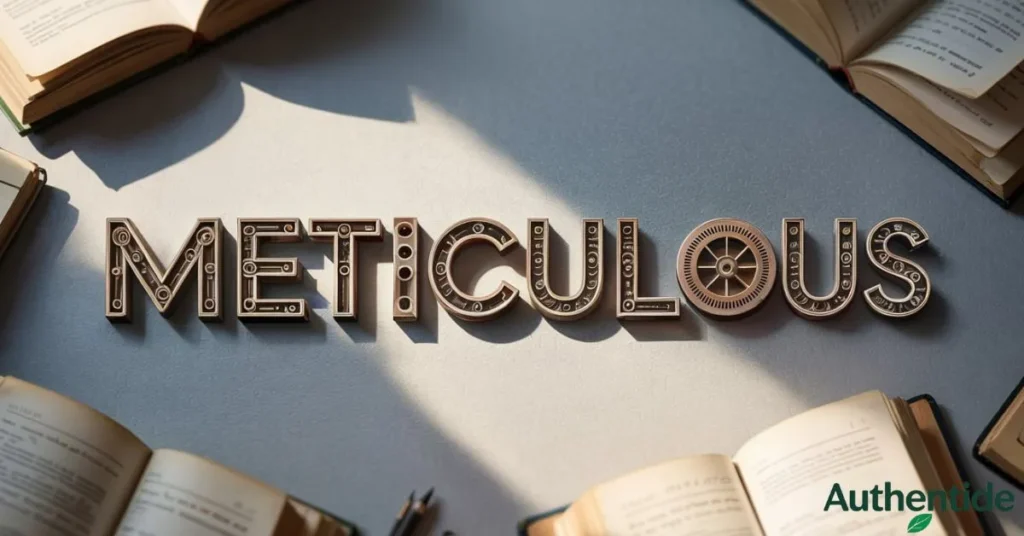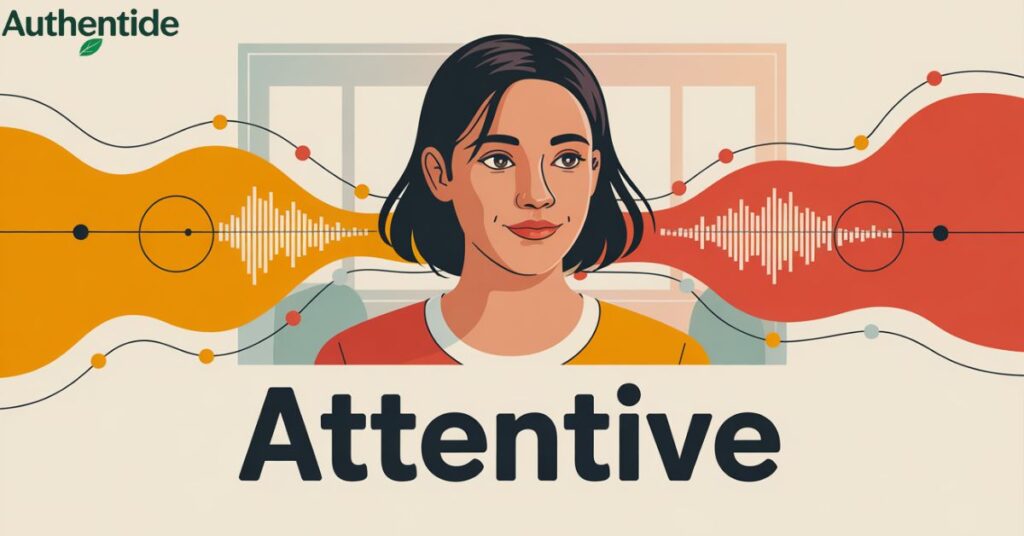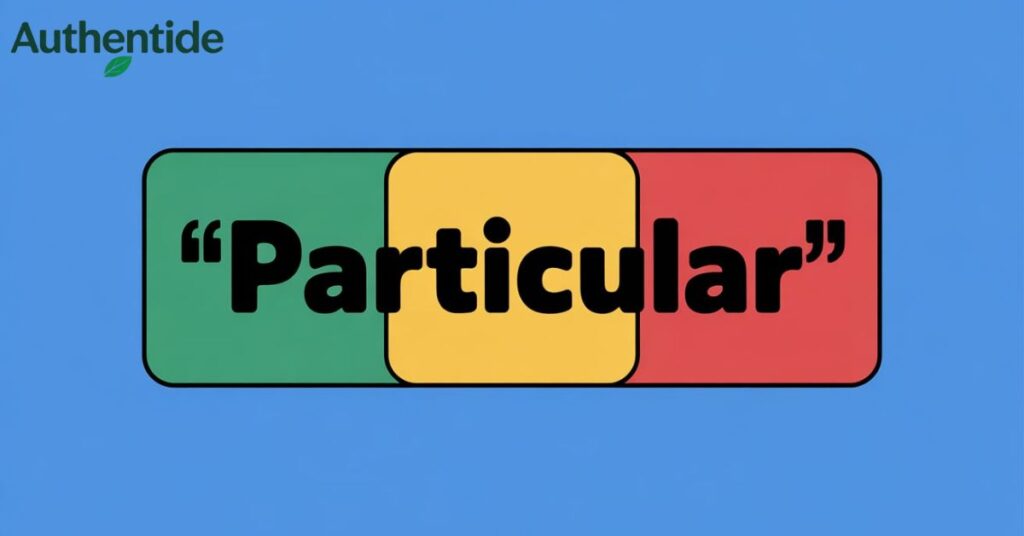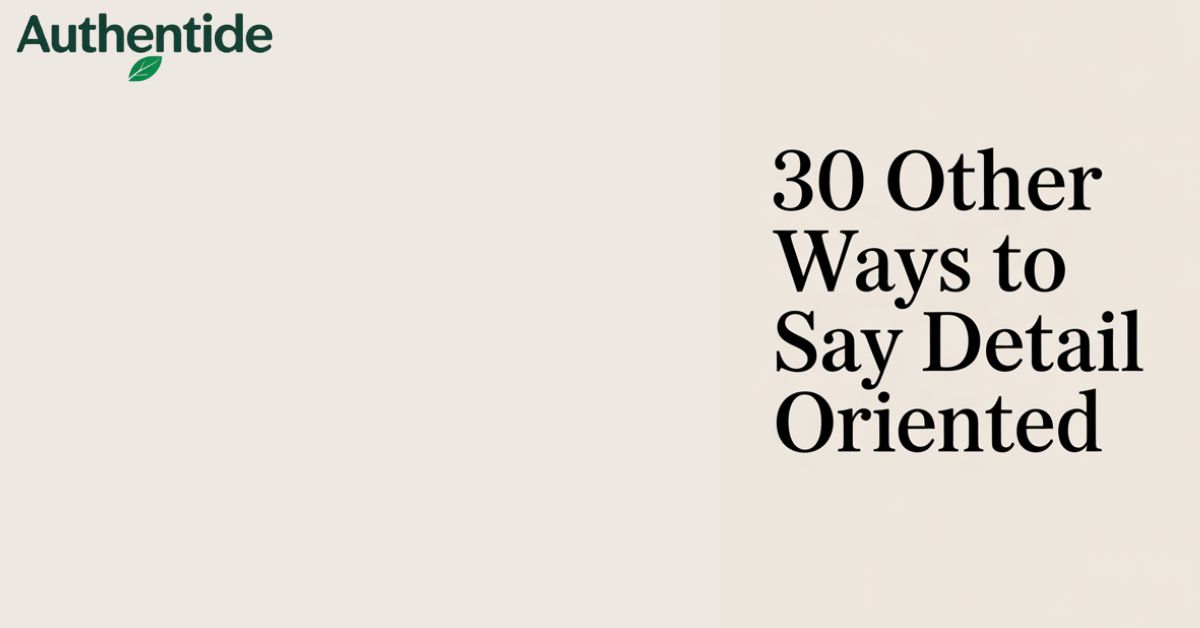Being “detail oriented” is a valuable trait in nearly every profession, but using the same phrase over and over can get repetitive especially in resumes, performance reviews, or everyday communication. Whether you’re describing yourself, a coworker, or someone you’re hiring, having a fresh way to express this skill can make a lasting impression.
In this article, we’ll explore 30 alternative ways to say “detail oriented” that suit different tones and settings from professional to casual. Each option includes an example to help you see how it can fit naturally in real-world situations. So, if you’re ready to enhance your vocabulary and sharpen your descriptions, let’s dive into some standout alternatives.
Is It Professional To Say: “Detail Oriented”
Using “detail oriented” in professional contexts can be effective, but it’s become somewhat overused. While it clearly communicates a valuable skill, it risks sounding generic and failing to differentiate you from other candidates. For maximum impact, consider using more specific alternatives that precisely describe your particular strength, or better yet, demonstrate your attention to detail through concrete examples rather than simply stating it as a trait.
What to Say Instead of “Detail Oriented”
- Meticulous
- Precise
- Thorough
- Scrupulous
- Vigilant
- Fastidious
- Methodical
- Analytical
- Conscientious
- Discerning
- Exacting
- Attentive
- Painstaking
- Punctilious
- Detail-focused
- Accuracy-driven
- Precision-oriented
- Sharp-eyed
- Diligent
- Hawk-eyed
- Systematic
- Perceptive
- Rigorous
- Particular
- Quality-conscious
- Observant
- Careful
- Precise and Comprehensive
- Error-detecting
- Minutiae-minded
What Does “Detail Oriented” Actually Mean?
Being detail oriented means possessing the natural ability or developed skill to notice, track, and manage small elements within larger systems or projects. It involves consistently maintaining high standards of accuracy, thoroughness, and precision in your work. Detail-oriented professionals don’t just focus on the big picture—they understand that excellence often lives in the smallest components of any task.
This valued soft skill encompasses several key attributes:
- Thoroughness in examining all aspects of work
- Precision in execution and delivery
- Organizational ability that keeps track of multiple elements
- Quality focus that catches errors before they become problems
- Analytical thinking that considers implications of small details
Detail orientation isn’t just about perfectionism—it’s about understanding which details matter most in a particular context. Effective professionals know when to dive deep into specifics and when a broader approach serves better. This balanced perspective makes attention to detail a particularly valuable trait during the job search process.
30 Powerful Alternatives to “Detail Oriented”
Here are 30 Powerful Alternatives to “Detail Oriented” (With Example):
1. Meticulous

Meticulous describes someone who shows extreme care and precision in their work, leaving nothing to chance.
Example: In an email to a client: “Rest assured, James, our team will handle your financial audit with meticulous attention. We’ll examine every transaction record thoroughly to ensure complete compliance with regulatory standards.”
2. Precise
Being precise means executing tasks with exact accuracy and correctness, particularly important in technical fields.
Example: In a performance review: “Sarah’s precise calibration of laboratory equipment has consistently produced more reliable test results than we’ve ever achieved before, reducing our margin of error by 15%.”
3. Thorough
A thorough professional completes work comprehensively, ensuring no element is overlooked or incomplete.
Example: In project documentation: “Miguel’s thorough analysis of user feedback identified three critical pain points that our previous research had missed, fundamentally reshaping our product development priorities.”
4. Scrupulous
Scrupulous workers demonstrate exceptional moral integrity alongside careful attention to correctness and propriety.
Example: In a recommendation letter: “Amara’s scrupulous approach to client data management has set new standards in our practice. She consistently verifies permissions before sharing even internally, protecting both our clients and our firm.”
5. Vigilant
Being vigilant means maintaining careful observation and alertness, especially regarding potential problems or changes.
Example: In a team message: “Thanks to Chen’s vigilant monitoring of our server performance metrics, we identified and addressed the bottleneck before any customers experienced downtime.”
6. Fastidious

A fastidious person pays exceptional attention to accuracy, detail, and cleanliness, often with demanding standards.
Example: In feedback to a designer: “Your fastidious attention to typography consistency across all marketing materials has created a much more cohesive brand experience for our customers.”
7. Methodical
Methodical professionals follow established procedures with careful, systematic attention to each step.
Example: In a project handover document: “Raj’s methodical documentation of each client interaction makes it easy for anyone to step in and continue providing seamless service while he’s on leave.”
8. Analytical
An analytical mindset examines complex information in detail, breaking it down to understand relationships between elements.
Example: In an interview response: “My analytical approach to market research helped identify a previously unnoticed demographic segment that ultimately accounted for 28% of our growth last quarter.”
9. Conscientious
Being conscientious means performing work with careful attention to what is required and consideration of how it affects others.
Example: In a client proposal: “Our team’s conscientious approach to resource allocation ensures we’ll complete your project not just on time, but with optimal efficiency and minimal waste.”
10. Discerning
A discerning individual notices subtle differences and makes fine distinctions between similar items or concepts.
Example: In wine industry correspondence: “Eliza’s discerning palate identified subtle flavor notes that helped us adjust our fermentation process, resulting in our highest-rated vintage to date.”
11. Exacting
An exacting person has extremely high standards and demands perfection in themselves and others.
Example: In architectural feedback: “David’s exacting standards for structural drawings have prevented numerous potential issues that would have only emerged during construction, saving both time and materials.”
12. Attentive

Being attentive means paying close attention to needs, requirements, and changes as they occur.
Example: In customer feedback: “The attentive service from your representative Priya made all the difference. She anticipated questions before I even asked them and followed up at exactly the right intervals.”
13. Painstaking
Painstaking work involves great care and thoroughness, often requiring significant effort to achieve high quality.
Example: In an art restoration proposal: “Our team will take a painstaking approach to preserving the original brushwork while addressing the damage, using techniques specifically developed for works of this period.”
14. Punctilious
A punctilious person pays extreme attention to formalities, rules, and precise details.
Example: In diplomatic correspondence: “Ambassador Lee’s punctilious adherence to protocol during negotiations created an atmosphere of mutual respect that facilitated agreement on previously contentious points.”
15. Detail-focused
Being detail-focused means naturally gravitating toward the specific elements that compose larger systems or projects.
Example: In a software development context: “Maya’s detail-focused code reviews have caught security vulnerabilities that even automated testing missed, significantly improving our application’s resilience.”
16. Accuracy-driven
An accuracy-driven professional prioritizes correctness above all else in their work.
Example: In laboratory documentation: “Our accuracy-driven approach to sample analysis includes triple verification protocols that exceed industry standards by a significant margin.”
17. Precision-oriented
Precision-oriented work emphasizes exact measurements, specific language, and finely calibrated processes.
Example: In engineering specifications: “This manufacturing process requires a precision-oriented approach, maintaining tolerances within 0.005mm throughout production.”
18. Sharp-eyed

Being sharp-eyed means quickly noticing visual details others might miss.
Example: In editorial feedback: “Thomas’s sharp-eyed review caught inconsistencies in the footnoting system that would have undermined the manuscript’s scholarly credibility.”
19. Diligent
A diligent person shows persistent and careful effort in their work.
Example: In a reference letter: “Sophia’s diligent follow-up with prospective clients transformed our conversion rate, establishing relationships that have sustained our business through market fluctuations.”
20. Hawk-eyed
Being hawk-eyed means having exceptional ability to spot small details or errors from a distance.
Example: In publishing feedback: “Our hawk-eyed proofreader Kenji identified formatting inconsistencies across the 500-page manuscript that would have affected digital conversion quality.”
21. Systematic
A systematic approach involves working according to comprehensive, organized methods.
Example: In project management: “Laura’s systematic approach to stakeholder communication ensures everyone receives exactly the information they need at optimal intervals, eliminating both gaps and overwhelm.”
22. Perceptive
Being perceptive means having keen insight and understanding, often noticing what others miss.
Example: In customer research: “Amir’s perceptive analysis of user testing videos identified non-verbal cues indicating confusion with our interface that participants didn’t explicitly mention.”
23. Rigorous
A rigorous professional applies extremely thorough and strict standards to their work.
Example: In academic review: “The rigorous methodology employed in this study addresses previous criticisms and establishes a new standard for research in this field.”
24. Particular

Being particular means being very specific about requirements and attentive to exactly how things should be.
Example: In interior design communication: “Our client is quite particular about lighting sources—please prepare samples demonstrating both LED and halogen options with precise color temperature specifications.”
25. Quality-conscious
A quality-conscious person prioritizes excellence in all aspects of their work, often beyond basic requirements.
Example: In manufacturing documentation: “Our quality-conscious production team implemented additional inspection points that weren’t required by regulations but have reduced customer returns by 37%.”
26. Observant
Being observant means carefully watching and noting details, changes, and patterns.
Example: In retail management: “Jamie’s observant monitoring of customer traffic patterns led to our new layout design, which has increased average time in store by 12 minutes.”
27. Careful
A careful professional works with thoughtful attention to avoid mistakes or problems.
Example: In financial services: “Your careful review of our tax situation identified deductions we’ve missed for years—your thoroughness has literally paid for itself many times over.”
28. Precise and Comprehensive
Combining precise and comprehensive approaches ensures both accuracy in details and complete coverage of all relevant areas.
Example: In legal correspondence: “Our precise and comprehensive contract review process examines both technical language and practical implications for your business operations over the entire agreement term.”
29. Error-detecting
Having strong error-detecting abilities means consistently identifying mistakes or problems before they cause issues.
Example: In software testing: “Zara’s exceptional error-detecting skills identified an edge case that would have affected approximately 2% of users—a small but significant portion of our customer base.”
30. Minutiae-minded

Being minutiae-minded means comfortably working with extremely small details and keeping track of many specific elements.
Example: In event planning: “Derek’s minutiae-minded coordination tracked over 200 individual dietary restrictions for our international conference, ensuring every attendee could enjoy appropriate meals throughout the event.”
When to Use These Alternatives
In Your Resume
Your resume experience section benefits from precise language that demonstrates how your attention to detail created measurable impact. Rather than simply claiming to be “detail oriented,” show it through specific accomplishments.
For example, instead of: “Detail oriented professional responsible for financial reporting.”
Try: “Meticulous financial analyst who identified $127,000 in potential tax savings through scrupulous review of previous filings.”
In Cover Letters
Your cover letter offers space to elaborate on how your detail orientation manifests in ways relevant to the specific position. Use these alternatives to create a compelling narrative.
For example: “My analytical approach to customer feedback helped my previous employer increase satisfaction scores by 27% in just six months by identifying and addressing previously overlooked pain points in the user journey.”
During Interviews
When facing interview questions about your working style, these alternatives help provide rich, specific examples that demonstrate your thoroughness in action.
For example, if asked about handling complex projects: “I take a methodical approach to complex projects, breaking them into clearly defined components. In my last role, this enabled me to simultaneously manage three product launches without missing a single deadline.”
Why Varied Language Matters in Professional Communication
Using varied and precise language in your job application materials demonstrates several valuable qualities beyond just attention to detail:
- Communication skill – Varied vocabulary shows linguistic flexibility
- Self-awareness – Specific terms indicate understanding of your particular strengths
- Audience awareness – Tailored language demonstrates consideration of what matters to the reader
- Genuine expression – Avoiding clichés makes your materials more authentic and memorable
By thoughtfully selecting the most appropriate synonym for each specific context, you’ll create more compelling, precise, and effective professional communications that genuinely reflect your capabilities and help advance your career goals.
Frequently Asked Question
What is another way to say detail oriented?
Another way to say “detail oriented” is “meticulous.” You could also use terms like “thorough,” “precise,” “scrupulous,” or “fastidious” depending on the specific quality you want to emphasize.
How do you describe someone who pays attention to detail?
Someone who pays attention to detail can be described as meticulous, thorough, or precise. They notice small elements others might miss, catch errors before they become problems, and maintain high standards of accuracy in their work. These individuals often excel at quality control, proofreading, and tasks requiring careful examination. They’re typically organized, patient, and take pride in getting things right the first time, making them valuable team members in virtually any professional setting.
How do you say detail-oriented as a strength?
When highlighting detail-oriented skills as a strength, you might say: “My ability to thoroughly examine work with precision and catch subtle inconsistencies helps me deliver error-free results.” Or more specifically: “I excel at identifying critical details others might overlook, which has consistently improved project outcomes and prevented potential issues.” You can also emphasize this strength by noting: “My meticulous approach to tasks ensures quality and accuracy, particularly when handling complex information or projects with multiple components.”
Putting It All Together
The next time you need to convey your detail orientation, consider which specific aspect of thoroughness matters most in that context. Are you highlighting accuracy? Methodical processes? Error detection? Choose the term that most precisely captures your particular strength.
Remember that demonstrating attention to detail goes beyond claiming it—these alternative expressions work best when paired with specific examples that show your thoroughness in action. By combining precise language with concrete achievements, you’ll make a more compelling case for your capabilities than simply repeating “detail oriented” across all your professional materials.

Your go-to place for smart synonyms and celebrity updates. Muhammad Hassan Abid is dedicated to creating useful, engaging content that informs, inspires, and truly serves your curiosity

